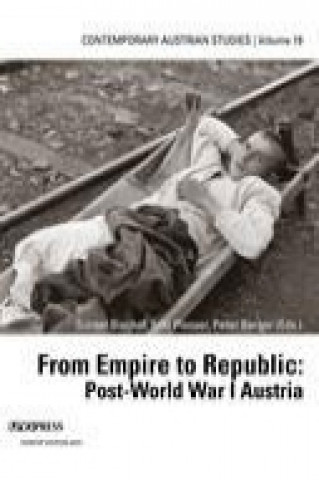
Kód: 12779542
From Empire to Republic: Post-World War I Austria
Autor Günter Bischof, Fritz Plasser, Peter Berger
The breakup of the Habsburg Dual Monarchy and the redrawing of the political map of East Central Europe constituted a major experiment in "destroying the old, and creating the new" (O. Hwaletz). Historians are more inclined to stu ... celý popis
- Jazyk:
 Angličtina
Angličtina - Vazba: Brožovaná
- Počet stran: 448
Nakladatelství: Books on Demand, 2010
- Více informací o knize

Mohlo by se vám také líbit
-

One of our Thursdays is Missing
302 Kč -

View from Penthouse B
382 Kč -

Good Food Good Mood Cookbook
433 Kč -

Open Your Heart
337 Kč
Darujte tuto knihu ještě dnes
- Objednejte knihu a zvolte Zaslat jako dárek.
- Obratem obdržíte darovací poukaz na knihu, který můžete ihned předat obdarovanému.
- Knihu zašleme na adresu obdarovaného, o nic se nestaráte.
Více informací o knize From Empire to Republic: Post-World War I Austria
Nákupem získáte 82 bodů
 Anotace knihy
Anotace knihy
The breakup of the Habsburg Dual Monarchy and the redrawing of the political map of East Central Europe constituted a major experiment in "destroying the old, and creating the new" (O. Hwaletz). Historians are more inclined to study the rise of empires than their demise and aftermath. The eighteen essays in this volume offer fresh perspective and innovative scholarship on the difficult transition from empire to republic for the small state of Austria, newly created by the Allied peacemakers in Paris in 1919. These essays also deal with complex challenges of nation building after a major war as well as the ambiguity inherent in the creation of new institutions in politics, economics, social life and culture. In 1919 the government of the instable and fledgling Republic of Austria faced the task of integrating more than a million of returning war veterans and taking care of 110,000 wounded veterans returning from the frontlines. The government was also confronting revolutionary turmoil in the streets of Vienna, a neartotal collapse of the agricultural and industrial economies and near-mental breakdown from the trauma of defeat. Hyperinflation produced a financial crisis in the early 1920s and major economic challenges in the banking and industrial sectors. The redrawn borders produced loss of German ethnics and major demographic shifts. Pan-Germanism was an ideology popular in all political camps. "Austrians" - no longer dominant in a vast empire - were searching for a new identity. After four years of war, Austrians had to confront defeat and constructed a national memory from painful personal remembrances. Most families were dealing with family members returning from a long and destructive war with limbs missing and souls deranged. In spite of ideological conflict between the major political camps, a national cultural revival ensued and new educational institutions were born. Cover photo: A severely wounded soldier from the battle on the Isonzo front awaits transport to the hospital on 23 August 1917. (Photo courtesy of Picture Archives of the Austrian National Library)
 Parametry knihy
Parametry knihy
822 Kč
- Plný název: From Empire to Republic: Post-World War I Austria
- Autor: Günter Bischof, Fritz Plasser, Peter Berger
- Jazyk:
 Angličtina
Angličtina - Vazba: Brožovaná
- Počet stran: 448
- EAN: 9783902719768
- ISBN: 3902719761
- ID: 12779542
- Nakladatelství: Books on Demand
- Hmotnost: 688 g
- Rozměry: 233 × 159 × 33 mm
- Datum vydání: 08. October 2010
Oblíbené z jiného soudku
-

Dune
216 Kč -

Haunting Adeline
621 Kč -

Berserk Deluxe Volume 2
1092 Kč -

White Nights
90 Kč -

Powerless
268 Kč -

Atomic Habits
330 Kč -

Dune Messiah
228 Kč -

Berserk Deluxe Volume 3
1142 Kč -

One Day
221 Kč -

Berserk Deluxe Volume 1
1115 Kč -

Iron Flame
368 Kč -

Surrounded by Idiots
213 Kč -

Harry Potter and the Prisoner of Azkaban (Minalima Edition)
993 Kč -

Gravity Falls Journal 3
443 Kč -

Heaven Official's Blessing: Tian Guan Ci Fu (Novel) Vol. 1
440 Kč -

The Creative Act
568 Kč -

Dune
276 Kč -

Hunting Adeline
624 Kč -

A Little Life
290 Kč -

Children of Dune
230 Kč -

Heaven Official's Blessing: Tian Guan Ci Fu (Novel) Vol. 2
427 Kč -

Bungo Stray Dogs, Vol. 8 (light novel)
383 Kč -

Percy Jackson and the Olympians 5 Book Paperback Boxed Set
944 Kč -

Solo Leveling, Vol. 1
440 Kč -
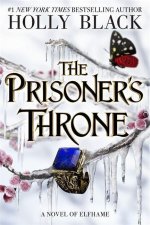
The Prisoner's Throne
247 Kč -

Court of Thorns and Roses
268 Kč -

Cry Baby Coloring Book
276 Kč -
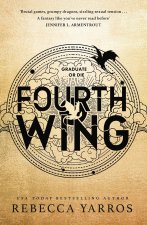
Fourth Wing
405 Kč -

Icebreaker
199 Kč -

Berserk Deluxe Volume 6
1089 Kč -

Avatar, the Last Airbender: The Kyoshi Novels (Box Set)
986 Kč -

The 48 Laws of Power
601 Kč -

House of Leaves
611 Kč -

Twisted Lies
213 Kč -
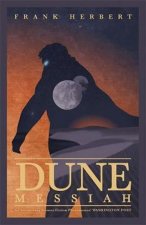
Dune Messiah
272 Kč -

No Longer Human
359 Kč -

48 Laws Of Power
331 Kč -

Twisted Games
213 Kč -

Caraval Paperback Boxed Set
902 Kč -

Solo Leveling, Vol. 2
468 Kč -
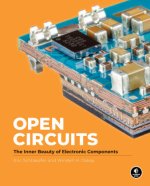
Open Circuits
907 Kč -

Berserk Deluxe Volume 5
1119 Kč -

Heaven Official's Blessing: Tian Guan Ci Fu (Novel) Vol. 3
476 Kč -

Berserk Deluxe Volume 4
1292 Kč -

Court of Mist and Fury
206 Kč -

SOLO LEVELING V08
436 Kč -
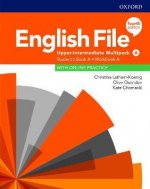
English File Upper Intermediate Multipack A (4th)
531 Kč -

CHAINSAW MAN V14
251 Kč -

Before the Coffee Gets Cold
184 Kč
Osobní odběr Praha, Brno a 12903 dalších
Copyright ©2008-24 nejlevnejsi-knihy.cz Všechna práva vyhrazenaSoukromíCookies



 Vrácení do měsíce
Vrácení do měsíce 571 999 099 (8-15.30h)
571 999 099 (8-15.30h)